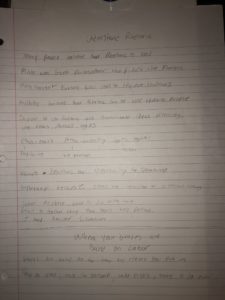Kayla’s Week 2 Response
On May 18, 2017, The New York Times published three-part series called “Antarctica Dispatches”. In this series, The New York Times takes advantage of the advancement of technology to tell the story of Antarctica, the seventh continent. The first part starts off with a map of the continent and there are moving lines to show how the ice is moving, showing them move towards the Ross Sea. When you read the article itself, you learn that the ice sheets are melting at rate so rapid that scientist are worried that sooner or later, coastal cities would have to seek refuge from their own homes due to rise in sea levels. The article also goes on to explain how scientist are attempting to solve this top priority issue and to show the audience what they mean, a video is provided. The interactive video at the bottom of the article allows the viewer to move the camera around and watch the scientist equipment at work. In the article, the author stresses the importance of scientist to figure out a way to slow down the disintegration of the ice sheets and by using these visuals, this importance is stressed beyond words. The interactivity of this article allows the reader to someone experience the urgency and realize the effects that greenhouse gases have on themselves, indirectly. The visuals also act as a summarizer for the article. For people who don’t always have the time to read the full article, the visuals provided show the issue they talk about in the article following. In part two for example, as the reader scrolls, the geographical makeup of Antarctica is shown and there are short captions to indicate whats happening, acting to consolidate information. I think that this way of presenting information, especially in the STEM filed is effective because often, the information regarding STEM subject is dense and not for everyone but using these interactive ways to engage the reader’s attention can capture a wide variety of audiences.
Gillis, Justin, et al. “Miles of Ice Collapsing Into the Sea.” The New York Times, The New York Times, 18 May 2017, www.nytimes.com/interactive/2017/05/18/climate/antarctica-ice-melt-climate-change.html.



